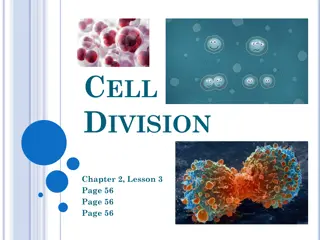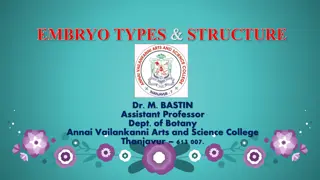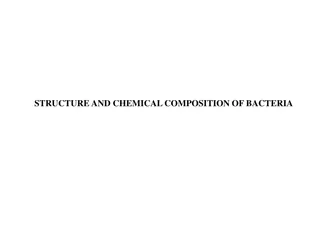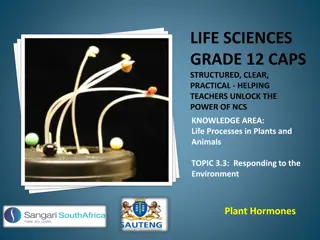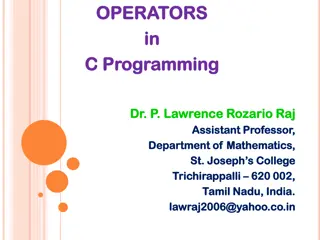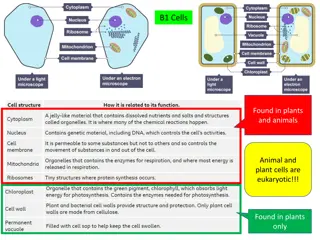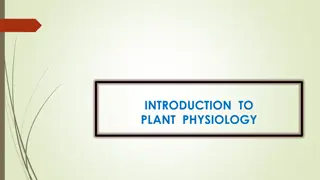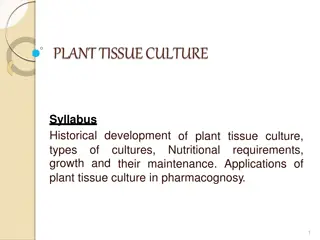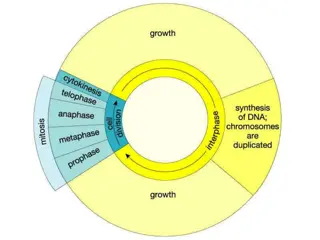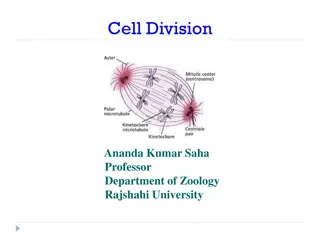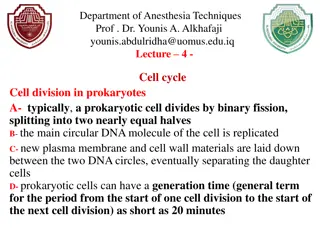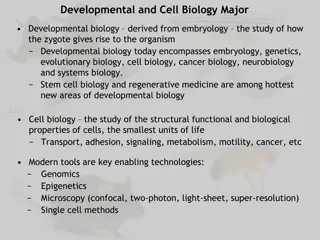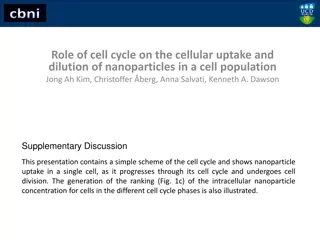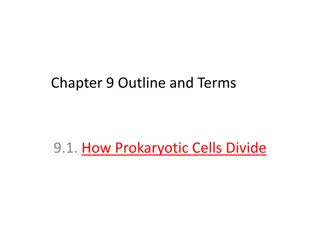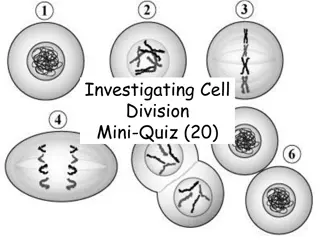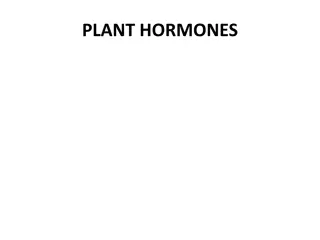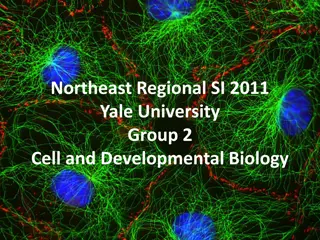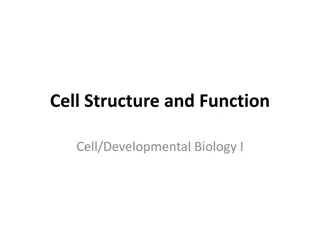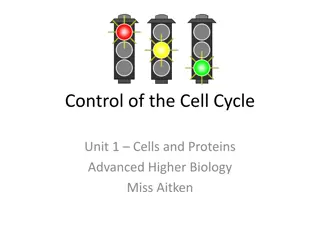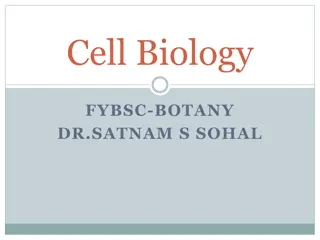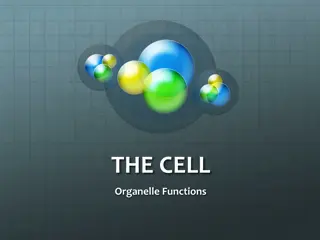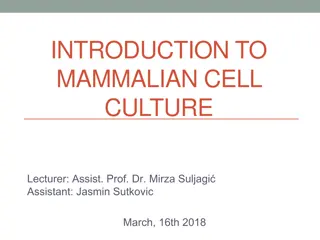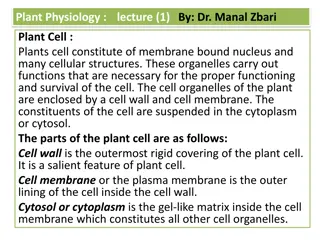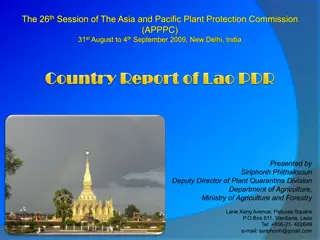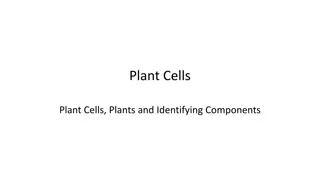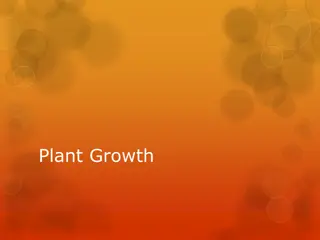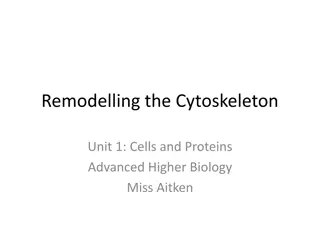Vi-CELL.BLU - Advanced Cell Counting Instrument
Vi-CELL.BLU is a cutting-edge cell counting instrument that offers faster analysis, increased resolution, and improved optical sensor technology for enhanced cell concentration and viability assessments. The device features a user-friendly interface, Trypan blue method for live cell detection, and a
1 views • 19 slides
Understanding Cell Viability Assays in Laboratory Testing
Cell viability assays play a crucial role in determining the health and status of cells, measuring their ability to survive and proliferate. These assays involve various techniques such as dye exclusion, colorimetric, fluorometric, luminometric, and flow cytometric assays. By assessing factors like
6 views • 16 slides
Understanding Cell Division: Functions and Stages
Explore the functions and stages of cell division through a comprehensive overview covering topics such as the importance of cell division in growth, repair, and reproduction, the stages of the cell cycle, and the comparison of different cell cycles. Engage with visual aids and concept maps to deepe
4 views • 43 slides
Understanding Plant Embryogenesis: A Comprehensive Overview
Plant embryogenesis is a crucial process in the development of plant embryos from fertilized ovules, involving cell division, differentiation, and morphogenesis. This process leads to the formation of seeds, which play a vital role in the plant life cycle. The stages of embryo formation, structure,
0 views • 25 slides
Bacterial Cell Structure and Composition Overview
Bacterial cells exhibit variations in size, typically ranging from 0.75 to 1.5 micrometers. The cell envelope, comprising glycocalyx, cell wall, and cell membrane, plays crucial roles in protection and cell function. The cell membrane, a thin barrier rich in phospholipids and proteins, is integral t
1 views • 28 slides
Understanding Plant Hormones and Their Functions in Plants
Plant hormones play crucial roles in various plant processes such as growth, development, and response to environmental stimuli. Auxins, gibberellins, and abscisic acid are key plant hormones that regulate tropisms, cell division, elongation, flowering, seed germination, and dormancy. Understanding
1 views • 50 slides
Understanding Plant Tissue Culture Media and Their Importance in In Vitro Growth
Plant tissue culture media play a crucial role in the in vitro growth and morphogenesis of plant tissues. The composition of culture media depends on the specific plant species and the type of material used for culture. Various types of media, such as White's medium, MS medium, B5 medium, N6 medium,
0 views • 6 slides
Overview of Cell Culture Methods and Importance in Research
Introduction to the principles of cell culture, including tissue culture, organ culture, and cell culture methods. Discusses the advantages and disadvantages of each technique and highlights the need for cell culture in research for studying cellular behavior and large-scale production of cell mater
3 views • 45 slides
Understanding Arithmetic Operators in C Programming
C programming language provides various arithmetic operators such as addition, subtraction, multiplication, division, and modulo division. Integer division truncates any fractional part, while modulo division produces the remainder of an integer division. When operands in an arithmetic expression ar
1 views • 18 slides
Cell Structure and Function: A Comprehensive Overview
Delve into the world of cells, exploring the distinct features of animal and plant cells, the differences between prokaryotic and eukaryotic cells, the significance of organelles, and the fascinating processes such as stem cell differentiation and cell adaptation. Discover how substances move across
0 views • 5 slides
Introduction to Plant Physiology: Exploring the Functioning of Plants
Plant physiology is a crucial subdiscipline of botany that delves into the processes and functions operating within plants. This field closely examines areas like plant morphology, ecology, cell biology, and genetics, shedding light on vital processes such as photosynthesis, respiration, and more. T
1 views • 7 slides
Regulation of the Cell Cycle: A Comprehensive Overview
Variation in cell cycle length in humans, controlled by internal and external mechanisms, with special proteins and checkpoint systems ensuring proper progression. External events trigger initiation and inhibition of cell division, while internal checkpoints maintain genetic integrity and chromosome
4 views • 14 slides
Understanding Plant Tissue Culture: Techniques and Applications
Plant tissue culture involves maintaining and growing plant cells, tissues, or organs in artificial mediums under controlled conditions. It allows the regeneration of whole plants from small plant parts or cells. Hormones like auxins, cytokinins, and gibberellins are used in the process. Proper envi
3 views • 5 slides
Understanding Cellular Division and Cell Cycle Regulation
Explore the concept of cellular division and the cell cycle through a comprehensive unit designed to address common misconceptions. Students will learn about oncogenes, tumor suppressors, and the regulation of cell division in multicellular organisms. Emphasis is placed on differentiating between th
0 views • 22 slides
Plant Tissue Culture: Historical Development, Techniques, and Applications
Plant tissue culture is an experimental technique that involves the in-vitro cultivation of plant cells to produce secondary metabolites, regenerate plants, and study organogenesis. This process allows for the maintenance of disease-free plant material, biosynthetic pathway tracing, and cell immobil
0 views • 21 slides
Understanding the Cell Cycle and Mitosis Process
The cell cycle consists of two main periods: Interphase and Mitosis. During Interphase, the cell prepares for division by growing in size and copying chromosomes. Mitosis, the division of the nucleus, results in the formation of two daughter cells with identical chromosome copies. Centrioles and cen
0 views • 26 slides
Understanding Cell Division: Processes and Types
Cell division is a vital process in living cells for growth and reproduction. This article explores the basics of cell division, including the cell cycle, types of cell division (such as mitosis and meiosis), and the initiation of cell division. It also covers key phases like interphase and provides
0 views • 20 slides
Overview of Cell Division in Prokaryotes and Eukaryotic Cells
Cell division plays a crucial role in the growth and reproduction of all organisms. In prokaryotic cells, binary fission is the primary mode of division, while eukaryotic cells undergo a more complex process involving cell growth, DNA replication, chromosome distribution, and cytokinesis. The cell c
0 views • 10 slides
Explore the World of Developmental and Cell Biology
Developmental biology, stemming from embryology, investigates how organisms evolve from a zygote. It merges various fields like genetics, cell biology, and cancer biology. Cell biology focuses on cell properties and behaviors, using tools like genomics and microscopy. Research areas include cancer c
0 views • 8 slides
Role of Cell Cycle in Nanoparticle Uptake and Dilution in Cell Population
The cell cycle plays a crucial role in the cellular uptake and dilution of nanoparticles within a cell population. This process involves different phases such as G1, S, G2, and M, each with specific functions related to cell growth, DNA synthesis, protein synthesis, and cell division. Understanding
0 views • 20 slides
Cell Division Mechanisms in Prokaryotic and Eukaryotic Cells
Prokaryotic cells divide through binary fission, while eukaryotic cells undergo mitosis with nuclear division and cytokinesis. Prokaryotic cells lack a nucleus and divide by replicating DNA and forming two identical daughter cells. Eukaryotic chromosomes, associated with histone proteins, undergo co
0 views • 56 slides
Investigating Cell Division Mini-Quiz - Learn About Cell Biology
Explore the world of cell division through a mini-quiz covering topics such as the importance of cell division, chromosome structure, mitosis, and more. Test your knowledge and enhance your understanding of cellular processes.
0 views • 41 slides
Plant Growth Hormones and Defense Mechanisms: Understanding Plant Responses to the Environment
Plant growth hormones and defense mechanisms play crucial roles in how plants respond to environmental stimuli such as water, sunlight, gravity, and more. From auxins promoting cell growth to gibberellins stimulating flowering, this presentation educates on the intricacies of plant hormones and thei
1 views • 13 slides
Understanding Plant Hormones and Their Role in Growth and Development
Plant hormones are vital compounds that regulate various processes in plant growth and development. They are mostly organic and can be gases. These hormones are produced in one part of the plant and transported to other parts where they induce physiological effects. The main phytohormones include Au
0 views • 125 slides
Fascinating Vocabulary of Cell Biology
Explore the intricate world of cell biology through fancy terminology for basic cell components, such as the cell membrane, cytoplasm, mitochondria, nucleus, and more. Discover the unique functions and structures of plant and animal cells as compared to different types of cells within each class. Vi
0 views • 19 slides
Understanding the Significance of the Cell Cycle in Growth and Development
This resource focuses on the cell cycle in the context of growth, development, and proliferation. It covers the significance of cell division, similarities in unicellular and multicellular organisms, the importance of CDK-mediated phosphorylation, and more. Students will learn to create schematic de
0 views • 24 slides
Exploring Cell Structure and Function in Developmental Biology
Discover the intricate world of cell structure and function in the context of developmental biology. Delve into the inner workings of organelles, their functions, and how they contribute to cellular activities. Engage in interactive activities like building cell models and playing Cell Detective to
0 views • 14 slides
Understanding Cell Cycle Control in Biology
Maintaining control of the cell cycle is crucial to producing healthy daughter cells and preventing mutations that can lead to degenerative diseases like Parkinson's or cancer. Cell cycle checkpoints at G1, G2, and Metaphase ensure the cell meets specific requirements before progressing to the next
0 views • 11 slides
Understanding Plant Cell Walls: Structure and Function
Plant cell walls play a crucial role in providing structure and protection to plant cells. This article delves into the composition of primary and secondary cell walls, highlighting the presence of cellulose, pectins, and glycans. The secondary cell wall, rich in lignin, offers mechanical support, e
0 views • 38 slides
Understanding Cell Structure and Function
Explore the intricate world of cell biology through this comprehensive guide covering the definition of a cell, the characteristics of animal cells, the role of the nucleus, ribosomes, cell structure, organelles, cell membrane, and cell wall. Discover the fascinating details of eukaryotic cells and
0 views • 61 slides
Understanding the Functions of Cell Organelles
Explore the vital functions of different cell organelles such as the cell membrane, nucleus, endoplasmic reticulum, lysosomes, Golgi apparatus, mitochondria, cytoplasm, ribosomes, vacuole, cell wall, chloroplasts, and chlorophyll in a cell. Learn how each organelle plays a unique role in maintaining
0 views • 38 slides
Establishing Plant Cell Division Plane: Key Mechanisms Unveiled
Plants exhibit a unique cell division process essential for growth and development. This process involves intricate control over the positioning of a new cell wall, crucial for proper patterning. Symmetrical and asymmetrical divisions play distinct roles in plant body formation, each regulated by sp
0 views • 9 slides
Basics of Mammalian Cell Culture
Mammalian cell culture involves the removal of cells from an organism for growth in a controlled environment. Primary cell cultures can be sub-cultured, leading to the generation of cell lines. Sub-culturing involves transferring cells to fresh growth media for further growth. Different methods and
0 views • 29 slides
Year 3 Division Methods and Facts Overview
Explore written calculation methods for division in Year 3, including facts related to times tables such as 2, 3, 4, 5, 8, and 10. Learn about mental division with remainders and progress to dividing numbers up to 4 digits by one- or two-digit numbers using short and long division in Year 4 and 5. D
0 views • 18 slides
Understanding Plant Cell Physiology and Functions
Plant cells are the fundamental units of life in the Plantae kingdom, comprising various organelles like the nucleus, chloroplasts, and mitochondria. These cells perform essential functions such as photosynthesis, cellular respiration, and storage. Differentiated by their unique cell walls, chloropl
1 views • 24 slides
Overview of Agricultural Departments and Plant Quarantine Division
The content discusses the various divisions and centers within the Department of Agriculture, including the Administration Division, Agronomy Management Division, and Plant Protection Center. It also touches on Plant Quarantine Division and the importance of entry/exit plant quarantine points in man
0 views • 18 slides
Understanding Animal Tissue Culture and Cell Line Production
Animal tissue culture involves growing tissues separate from the animal in a laboratory setting. To achieve exponential cell growth, cells are converted into immortal cell lines. The production of a cell line involves steps like breaking cell adhesion, incubation, and transferring cells to fresh med
0 views • 22 slides
Understanding Plant Cell Components: Nucleus, Cell Wall, Mitochondria, Cytoplasm, Chloroplasts
Plant cells consist of various components like the nucleus, cell wall, mitochondria, cytoplasm, and chloroplasts, each serving specific functions essential for the plant's growth and survival. The nucleus houses genetic information, the cell wall provides support, mitochondria produce energy, cytopl
0 views • 18 slides
Understanding Plant Cell Growth Mechanisms
Explore the fascinating world of plant cell growth with a focus on specialized cells like guard cells for gas exchange, meristematic cells for differentiation, and apical meristems for plant growth. Learn how stomata function to regulate water loss and support photosynthesis, and uncover the key pro
0 views • 17 slides
Understanding the Role of Microtubules in Cell Remodeling
The cytoskeleton, a network of fibers made from proteins, plays a crucial role in maintaining cell structure and shape. Microtubules, which are hollow straight rods made from tubulin proteins, control the movement of membrane-bound organelles and cell components. During cell division, microtubules a
0 views • 8 slides


